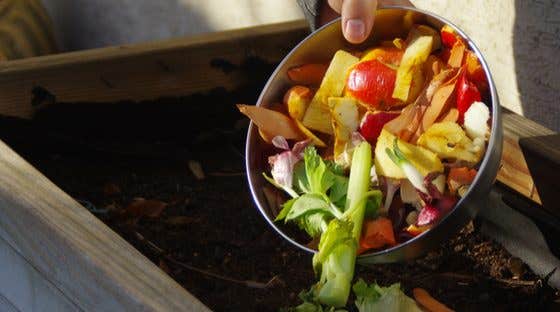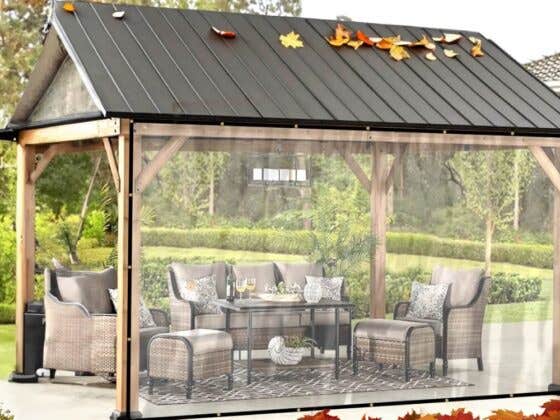Cooking up a storm in the kitchen and sharing meals with family is one of the many pleasures of life. If you’re looking to add some more joy to your culinary journey, consider implementing sustainable habits in the kitchen.
Sustainable cooking helps you savor food all the more. This is especially the case on summer evenings when you can enjoy natural food in natural surroundings and the weather has no need for your covers for outdoor furniture.
Organic, locally sourced ingredients, energy-efficient appliances, and natural cleaning products all play an important part in your sustainable kitchen endeavors. Here’s the simple steps you need for a kitchen that’s great for both your family and the planet.
Be Vocal for Local Ingredients
The importance of using fresh, locally sourced ingredients in your recipes can’t be overstated. Cooking with local produce guarantees freshness and supports local farmers.
There’s a wide variety of food that can be sourced locally, from fruits and vegetables to dairy products and meats. Local foods are typically pesticide- and preservative-free for the benefit of your family’s health.
Seek Out Sources

With a little research, you can locate the best spots for local ingredients. Neighborhood farmers’ markets are the best place to start. Not only are they conveniently nearby, you can also make valuable contacts and connections for future purchases.
Many grocery stores also stock local produce. Take note of their stock and encourage them to add more local options for their customers to enjoy.
Lastly, there are websites and local food interest boards that you can browse to find the best sources for your sustainable ingredients.
With Grocery Lists, Less Is More
The shelves of your local supermarket tend to be bursting with grocery options, and this wide variety of excessive choices can tempt us to buy more than we need.
Short grocery lists are the solution to this consumption conundrum. If you find that your kitchen is full of unused ingredients, it’s time to switch to a shorter list for your next shopping trip.
Keep an updated kitchen list of items you run out of quickest to get a better idea of what your household’s staples are. You can even utilize apps to keep tabs on what essentials you’ll need to stock up on next.
Planning Makes Perfect
Establishing a grocery budget can help cut down on your family’s consumption in the kitchen. Prioritize healthy foods in your budget and plan on buying only what you and your family need to make it through the week.
Another simple step towards sustainability is meal planning. When combined with a proper budget, planned meals cuts down on food waste, unused ingredients, and the temptation of buying candy and treats at checkout.
Make the Most When You Compost

Composting is an excellent way to manage waste, help the environment, and enrich your backyard’s soil all at once. When you compost, you’re doing your part to help your local ecosystem and foster a more sustainable kitchen.
Composting is simple. The easiest method is to keep a pail or a bucket with a lid in a kitchen corner and keep adding food scraps and waste to it. After a period of 2-4 weeks, you can add it to your soil or have it collected by a mobile compost service.
Know Your Compost

There are two main types of compost: green and brown. Knowing the difference between the two will make a world of difference in your composting journey.
Green compost includes fruit and vegetable scraps, eggshells, coffee grounds, and similar kitchen waste. Brown compost, on the other hand, consists mostly of fallen leaves, tree bark, paper, and even dryer lint.
The key to effective compost is to have a ratio of three parts brown to one part green. This ensures that your waste mixes together quickly and provides enough nutrients for your soil to thrive.
Be Efficient with Energy Use
Your modern kitchen is home to a variety of electrically powered appliances, from the dishwasher to the fridge and everything in between.
While these gadgets are convenient and nothing short of essential, the downside comes with the energy wasted by environmentally unfriendly appliances.
As a homeowner keeping sustainability in mind, you can take steps to prevent this waste of electricity. Installing energy-efficient appliances in your kitchen will make a noticeable difference in your ecological footprint as well as your electricity bill.
Energy Investigation

Start your inspection by checking the settings of appliances you currently use and finding out which ones are energy efficient. Typically, this information can be found on the warranty documents or on the back of the appliance.
Adjusting refrigerator temperatures, washing machine cycles and stove operations can also often help you save energy.
If there are any appliances you need to replace, make sure they adhere to energy standards. Not only will you save on lower utility bills, but you also help save the earth.
Go Natural with Cleaning Products, Too
You can bring sustainability to your kitchen and beyond with the help of natural, eco-friendly cleaning solutions that will keep your home fresh as well as earth-friendly.
Natural cleaners are free of harsh chemicals that can cause both your family and the environment harm and are typically cruelty-free as well. Making the switch to these cleaners is a simple step towards sustainability.
Look for eco-friendly, green, and “kid-safe” labels on your grocer’s cleaning products. Sustainable, environmentally beneficial products have become increasingly popular in recent years so finding them on the shelves shouldn’t be difficult. Find a non-abrasive soap and you can use it to clean your waterproof sofa covers as well.
DIY Delight

Some homemakers even make their own DIY cleaners. The most useful ingredients are, water, baking soda, vinegar, and lemon juice. Essential oils and olive oil can add that extra touch – and a delicious aroma.
DIY cleaners also work on your covers for outdoor furniture. They’re great for maintaining waterproof sofa covers, dining set covers, and fire pit covers. This will keep your furniture safe not just from food and drink spills but also harmful chemicals.

















Recent Comments